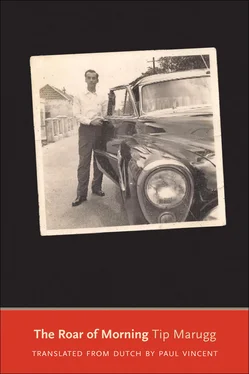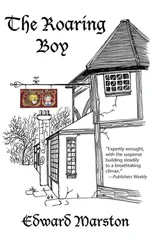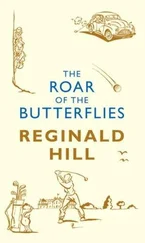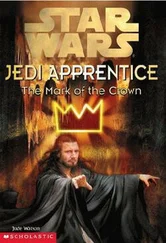Towards sunset, when it was time to go, my uncle would discover yet again that the basket was still full, and would ask me reproachfully, “Why didn’t you distribute the things among the prisoners?” But he never waited for an answer. He took the basket and hurried over to the prisoners already lined up waiting to be counted before marching back to the Castillo.
Once on our way home I asked my uncle about the thin man with the dead eyes and about what crime he had committed, and my uncle answered abruptly, “That’s El Verdugo. He’s driven by the forces of darkness. His soul is damned. You mustn’t bother with him.” This noncommittal reply only increased my sympathy for the man on the boulder.
After those trips to the Castillo I would lie in bed in the evening utterly exhausted, my back aching from all the sitting. Yet it took me some time to get to sleep. I would listen to the guitar music that drifted into my room almost every evening from the alleyway behind our house. It was usually a sombre, monotonous melody unaccompanied by any singing, which I found strange, as most people who play the guitar seem to feel that they have to sing as well. Between the strumming I heard other sounds: the cannon shots from the Castillo, the whistles of the guards, the sharp hissing sound when the air compressor was switched off, the loud clang when the tailgate of the pickup was dropped, the ceaseless clatter of pickaxes on the rocky ground, the rattling voice of my uncle, who could speak at such lightning speed about God in the work area of the prison. And once again I smelt the odours of the day: the freshly baked bread at the bus stop in the mornings, the starch from my uncle’s clothes as he sat bolt upright beside me on the bus, the orange and pineapple that rose from the basket, the reek of rum on the guards’ breath as they talked to my uncle, and most of all the smell of newly dug earth and crushed blocks of stone. I also saw an unending succession of images floating towards me: the curious grimaces my uncle made when he talked to the prisoners; the sweating, trembling flesh of the workers as they thrust their pneumatic drills into the earth; the clouded eyes of the man who never spoke, the man my uncle had called a “thug” and who exhaled cigarette smoke in spiralling wisps that dissolved like question marks in the windless afternoon; the long shadows of the convicts as they marched back to the Castillo in the twilight. Then I would shut my eyes even tighter, trying also to close my ears to all sound and to breathe as gently as possible: I strained to keep my body still, avoiding even the slightest movement and banishing all thoughts except those of falling asleep. It was on an evening such as this, when it was already dark and deathly quiet, that my boy’s hands discovered the taut hardness and the unfamiliar warmth in my loins. But then at once I heard my uncle speaking, in a voice more thunderous than the cannon of the Castillo, of the hellfire that awaited all sinners.
I was often left by myself during the twenty months I spent on the mainland. After lunch my uncle always went out to declaim biblical texts or to convene mysterious meetings in derelict houses. He did not return until the evening, sometimes very late. His wife was constantly travelling into the city or out into the countryside to sell her contraband to wealthy people and plantation owners. This was how she supported her husband. I was left at home with an elderly maid who left at four in the afternoon. Yet I did not feel abandoned. That was the time when I learned to love solitude and books. Even now I look back on the reclusive years of my youth with a certain fondness.
On the frequent days when there was no school, my uncle would sometimes teach me math, Spanish, biblical history and chess in the mornings. In the afternoons, when he had gone out, I secretly read the books in his bookcase. This wasn’t too easy at the start, but soon Spanish ceased to present any great difficulty. With few exceptions they were religious books, and I could not always understand the difficult passages. Eventually, because I was reading so much about religion and matters of faith and how man should live, I developed an intense curiosity about the other side of the coin. I yearned for “bad” books — but I was to have a long wait. In the meantime, however, I indulged my own fantasies, creating characters that I made do things I myself had never done. These fantasies, which sometimes lasted for hours and to which I was constantly adding new episodes, gave me great satisfaction and at the same time a sense of sinfulness, a contradiction that I blamed on the empty, silent house. I lived in a no-man’s-land seemingly equidistant from bad and good. The image of my uncle would loom up before me, dressed in immaculately pressed clothes, each hair on his head kept in its place by the green pomade that he rubbed in each morning, its musty smell still reminiscent of candles that had just been snuffed out. His starched clothes emphasised the tenseness in his body. At his side, his cool, calm, stately wife was always in her Sunday best. At such moments I felt sorry for my uncle and his wife; I almost hated them and longed to be home again.
Naturally, I did not spend the entire twenty months cooped up in the house like a monk. I had two friends at school whose houses I sometimes visited, and I also went for walks through the city. I went into the country a few times too: our ten-day visit to Chimbarí was particularly memorable.
That visit took place when rioting broke out in the city. It all started with a strike at the two government factories. The workers demanded a rise, put down their tools and took to the streets. There was turmoil all day long, but by the evening everyone was drunk and then the real pandemonium began. Fires were started in the streets. The police, now supported by the National Guard, carried out baton charges and arrested a hundred or so workers. Because the police station did not have enough cells, the prisoners were taken to the officers’ club just outside town, where they spent the night under guard in the tennis courts. In the morning, the workers were released and marched back to town.
When I went to school that morning, I found the big barred gate locked. I strolled round for a while with some other boys before setting off back home. As we got to the market a long procession of workers was just passing. A few young men at the front were singing, but the market women who lined the street in small groups greeted them with jeers and shouts.
“There go the heroes! Did you get your rise?”
“Are you going to be paid for yesterday and today?”
“What’s your family supposed to eat today? Shit?”
Some of the women started to clap rhythmically and shout “Left-right, left-right, left-right,” as if soldiers were marching past. At the sight of one worker who was hobbling past on one leg with the aid of a crutch, someone started shouting “Left-left,” which was quickly taken up by the others.
That evening the alcalde ’s house was stoned, one of the factories was burnt to the ground and a policeman was stabbed to death. The strike had turned into a riot.
My uncle considered it advisable to leave town until things had calmed down, so the following morning the three of us left for Chimbarí, where a good friend of his had a small farm. This was the first time I had ever been on a train and I thought it was wonderful, although I didn’t like the noise it made or the soot from the locomotive that found its way into the carriages. I was wide-eyed with wonder. While my uncle sat bolt upright in his seat holding an open book far too close to his nose, and his wife sat like a bored queen on her throne cooling herself with an ivory fan, I gazed in fascination at the landscape passing by. At the start it was not particularly interesting, as the train was travelling through an arid region, but suddenly, without any noticeable transition, everything became green. I saw hundreds of tree-covered hills dotted with bright red cottages. How could families live in such remote, inaccessible places, I wondered. What did they do all day? What happens if someone is taken seriously ill? I saw huge mountains, some half-covered in dark green but with bare, grey summits, through which flowed a vast river, apparently scarcely moving. I saw green fields stretching to the horizon, grazed by enormous herds of cattle. Sometimes it seemed as if the train was cutting straight through the middle of a herd.
Читать дальше












